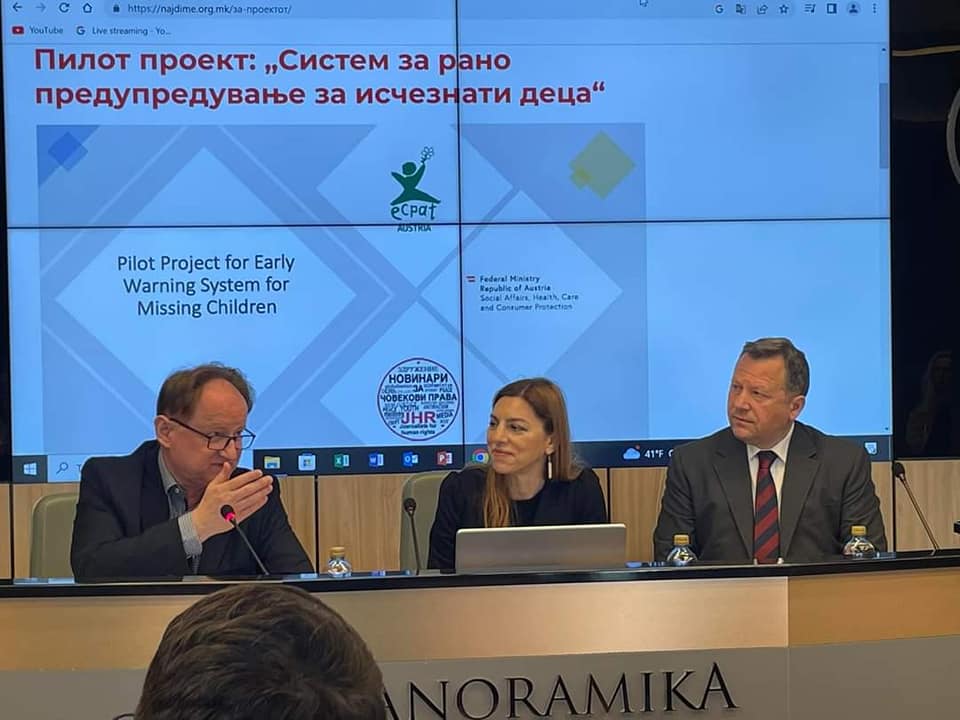Дводневна обука за градење на капацитетите на институционалните претставници ефективно да споделуваат информации за деца кои отсуствуваат од училиште, се одржа на 4 и 5 април 2023 година во Скопје, во рамки на „Пилот-проект за Систем за рано предупредување за исчезнати деца“ спроведуван од ГО „Новинари за човекови права“. Целта е со оваа дводневна обука да се продонесе во градење на капацитетите на институционалните претставници ефективно да споделуваат информации за децата кои отсуствуваат од училиште, а претставниците на институциите и властите заедно со 4 експерти од Австрија и Северна Македонија, ги јакнеа капацитетите за олеснета меѓуинституционална размена на информации. Крајна цел е олеснетите начини на меѓуинституционална комуникација помогнат во фукционирањето на веб-страницата Систем за рано предупредување за исчезнати деца придонесувајќи да се намали ризикот од исчезнување на децата.
На оваа дводневна обука се дискутираше за заштита и споделување на лични податоци, пристап до информации од јавен карактер, управување со траума и грижа за себе поврзани со исчезнати деца, со службениците за заштита на податоци во училиштата, наставниот кадар, центрите за социјални работи, Министерството за здравство.
Обуката започна со воведни зборови од Маг. Харалд Фугер, аташе на Федерално Министерство за социјални работи, здравство, грижа и заштита на потрошувачите на Република Австрија.
-Проектот за „пилотирање на систем за рано предупредување за исчезнати деца“ е една од успешните проектни апликации во контекст на меѓународниот повик направен од австриското социјално Министерство. Во рамките на овој проект, меѓу другото, веќе се остварени 3 студиски посети во Австрија за посета на релевантни институции, организации и засегнати страни и за да се видат примери на добри практики во оваа област. За да можат да ги исполнат меѓународните и европските обврски во полето на политиките за човекови права, важно е сите земји да воспостават ефективни механизми за координација и следење, како и професионални совети и услуги за поддршка, обезбедени особено од невладините организации – рече Маг. Харалд Фугер.
Како што рече, заштитата на децата мора да биде врвен приоритет за сите земји кои ја ратификувале Конвенцијата на ОН за правата на детето. За да може ефикасно да се зацврсти ова, потребен е посебен закон за заштита на децата кој ги опфаќа сите релевантни области како што се: независно тело за следење за спроведување на правата на децата, јасно разјаснување на обврските и задачите на сите засегнати страни кои работат со деца и млади луѓе за заштита на децата, разработка на стратегии и концепти за заштита на децата, доволно финансирање на мерки и услуги против експлоатација и трговија со деца, мерки против насилство и советодавни услуги и поддршка за жртвите, подигање на свеста, образование и еднакви можности, особено во однос на обесправените и ранливите групи.
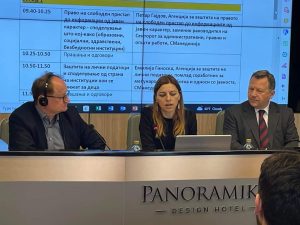
Александра Радевска, проектен координатор од „Новинари за човекови права“, ги презентираше досега спроведените активности како и главните цели и активности од проширувањето на проектот, посочувајќи дека целта на обуката е да се олесни принципот на размена на информации за деца кои отсуствуваат од училиште повеќе од три дена и на тој начин се изложени на ризик од исчезнување.
Експертите од Северна Македонија (Агенција за заштита на правото за слободен пристап до информации од јавен карактер, Агенција за заштита на лични податоци) споделуваа практики за заштита на личните податоци и пристапот до информации од јавен карактер и како да бидат достапни на веб-страницата – Систем за рано предупредување за исчезнати деца.
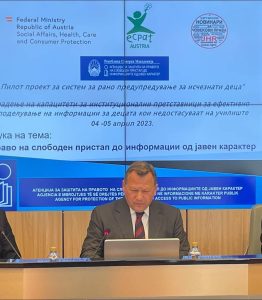 Петар Гајдов од Агенцијата за заштита на правото за слободен пристап до информациите од јавен карактер ја презентираше целта на Агенцијата и целта на Законот за кој е утврдена, обврските на имателите на информации, разликите меѓу проактивна и реактивна транспарентност како и деталните чекори и рокови кои треба да се следат во постапката по барање за информации од јавен карактер предвидени со Законот за слободен пристап до информации од јавен карактер. Се дискутираше и околу тоа што се може да биде информација од јавен карактер, како и за тоа дека училиштата можат да собираат и споделуваат информации за децата кои отсуствуваат од наставата, се додека личните податоци се заштитени. Беа образложени и исклучоците, како и тестот на штетност, а сето ова беше практично добличено до учесниците и со примери од работата на Агенцијата.
Петар Гајдов од Агенцијата за заштита на правото за слободен пристап до информациите од јавен карактер ја презентираше целта на Агенцијата и целта на Законот за кој е утврдена, обврските на имателите на информации, разликите меѓу проактивна и реактивна транспарентност како и деталните чекори и рокови кои треба да се следат во постапката по барање за информации од јавен карактер предвидени со Законот за слободен пристап до информации од јавен карактер. Се дискутираше и околу тоа што се може да биде информација од јавен карактер, како и за тоа дека училиштата можат да собираат и споделуваат информации за децата кои отсуствуваат од наставата, се додека личните податоци се заштитени. Беа образложени и исклучоците, како и тестот на штетност, а сето ова беше практично добличено до учесниците и со примери од работата на Агенцијата.
Емилија Гиноска од Агенцијата за заштита на личните податоци ги воведе принципите на заштита на личните податоци како и правата на субјектите на личните податоци. Таа ја воведе правната рамка и различните поими и нивното значење: Лични податоци, Контролор, Постапувач, Обработка, Согласност, Посебни категории на лични податоци. Се дискутираше и за транспарентоста и за обврските на поседувачите на информации.
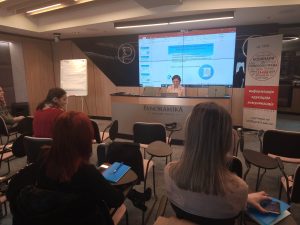 -Личните податоци се една од највредните валути во денешно време, се собираат и препродаваат. Има 6-годишни деца со профили на социјалните мрежи, играат онлајн, прават парични штети на родителите, но и мета се на предатори… Со децата е многу специфично, затоа правиме обуки и работилници, вели Гиноска.
-Личните податоци се една од највредните валути во денешно време, се собираат и препродаваат. Има 6-годишни деца со профили на социјалните мрежи, играат онлајн, прават парични штети на родителите, но и мета се на предатори… Со децата е многу специфично, затоа правиме обуки и работилници, вели Гиноска.
Беа посочени и практични примери на спорни случаи или злоупотреба да лични податоци од институции или приватни лица и начините на кои може да се казни и оспори таа злоупотреба.
Во темите за управување со траума и грижа за себе, експертите од Австрија споделија практики што се спроведуваат во нивните институции или практики на невладини организации и можат да бидат корисни за претставниците на институциите во Северна Македонија кога станува збор за ситуации на исчезнати деца, деца во ризик и исто така и во справувањето со семејствата, медиумите или други институции.
Вовед во управување со траума и грижа за себе поврзани со исчезнати деца даде Елизабет Хартл од Центар за заштита на деца – Ројте, а дискутирајќи за тоа, учесниците изјавија дека во центрите за социјална работа нема обуки за самогрижа, управување со стрес, исцрпеност… но и во училиштата особено по Ковид, менталното здравје беше видно влошено… Се дискутираше низ вежби и примери за социјалната поддршка, предупредувачките знаци, како и 7-те столбови на грижа за себе, ментална, емоционална, физичка, еколошка, духовна, рекреативна и социјална. Беше објаснет и АБЦ моделот на кризен менаџмент, а размената на добри пракси меѓу колегите беше посочена како многу корисна, како и тимската работа.
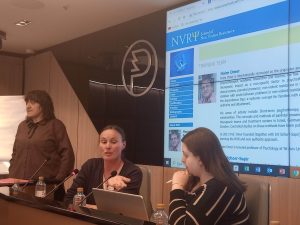 За мерки за градење односи и доверба и управување со разговори сесијата ја водеше Моника Штајнер Толиќ од Центар за заштита на деца – Тирол, која објаснувајќи ги стратегиите за разговор со деца објасни дека корисно е да се покаже топлина, емпатија, отвореност, да се оди на ниво на детето во надворешната и внатрешната положба, да се покаже љубопитност за детето, но и флексибилност. Кога разговарате со родителот, пак, како што вели таа, корисно е да се создаде заедничка основа за дискусија: родителот го сака најдоброто за своето дете, а вие го сакате најдоброто за него. Беа дискутирани и моделите на добри прашања, слушањето со внимание, амбиент за разговор, како и сумирање на разговорот, но и помошни материјали како боички и хартија за цртање, играчки кога се разговара со деца. Кога се работи со родителите добро е да се има позитивен коментар за нивното учество, а на крај е препорачливо да се направи протокол за родителите и децата.
За мерки за градење односи и доверба и управување со разговори сесијата ја водеше Моника Штајнер Толиќ од Центар за заштита на деца – Тирол, која објаснувајќи ги стратегиите за разговор со деца објасни дека корисно е да се покаже топлина, емпатија, отвореност, да се оди на ниво на детето во надворешната и внатрешната положба, да се покаже љубопитност за детето, но и флексибилност. Кога разговарате со родителот, пак, како што вели таа, корисно е да се создаде заедничка основа за дискусија: родителот го сака најдоброто за своето дете, а вие го сакате најдоброто за него. Беа дискутирани и моделите на добри прашања, слушањето со внимание, амбиент за разговор, како и сумирање на разговорот, но и помошни материјали како боички и хартија за цртање, играчки кога се разговара со деца. Кога се работи со родителите добро е да се има позитивен коментар за нивното учество, а на крај е препорачливо да се направи протокол за родителите и децата.
Од информациите споделени на дводневната обука за градење капацитети на институционалните претставници за ефективно споделување информации за децата кои отсуствуваат од училиште, она што беше нагласено корисно е создавање мрежа за полесна соработка на институциите, невладините организации и родителите и децата, со што ќе се постигне ефективност од процесот е корисен за децата и семејствата во пократок период и да не бидат разделени и во грижа на државата. Оваа практика добро функционира во Австрија, но потребно е време и правна структура што го помага процесот, но може да биде добар пример за ситуација кога социјалните служби нема доволно вработени, преоптоварени се и имаат премногу јурисдикции.
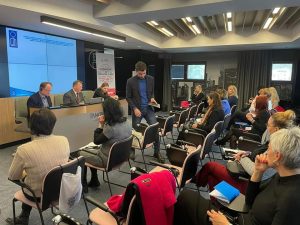 Подобрување на услугите за деца, со реформи во интегрираното кризно управување со социјалните служби, беше посочено од Маг. Харалд Фугер, можеби како посебна институција – Агенција за заштита на децата.
Подобрување на услугите за деца, со реформи во интегрираното кризно управување со социјалните служби, беше посочено од Маг. Харалд Фугер, можеби како посебна институција – Агенција за заштита на децата.
Информациите од јавен карактер, начинот на нивно споделување, заштитата на податоците и процедурите во согласност со регулативите за заштита на податоците се сметаа за добар начин да се надоврзат на напорите за поструктурирани информации за децата кои отсуствуваат од училиште и децата во ризик да исчезнат. Идните чекори, исто така, вклучуваат уште една обука каде што може да се подобрат прашањата за односите меѓу институциите и родител-дете. Системите за поддршка на училишниот персонал и повеќе обуки за грижа за себе, но и работа со деца и родители, како и подобрени протоколи со други институции беа споменати како важни прашања на кои треба да се продолжи со работа.
Континуираната работа на матичната книга на фантоми – лица без извод од матична книга на родените, беше посочена како важна и за децата кои лесно можат да станат жртви на трговија со луѓе и кои не можат да се следат како исчезнати деца или избегани, а работата на Здружението на млади адвокати и Министерството за труд и социјала и Центрите за социјални работи треба да продолжат, но и да работат со семејства кои имаат тенденција да ја напуштат државата 3 месеци и не даваат или немаат информации или правен доказ за статусот на образованието на детето додека е во странство.
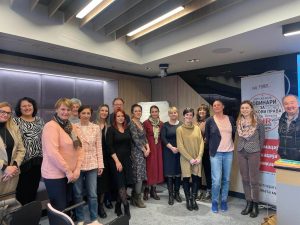 Сите учесници изразија подготвеност да ги здружат напорите во преземањето чекори за институционализирање и зајакнување на веб-страницата на системот за рано предупредување во Северна Македонија. Развојот на меѓуинституционален систем за размена на информации за децата кои отсуствуваат од училиште ќе го зајакне системот за рано предупредување со уште една алатка за минимизирање на ризикот од исчезнување на децата.
Сите учесници изразија подготвеност да ги здружат напорите во преземањето чекори за институционализирање и зајакнување на веб-страницата на системот за рано предупредување во Северна Македонија. Развојот на меѓуинституционален систем за размена на информации за децата кои отсуствуваат од училиште ќе го зајакне системот за рано предупредување со уште една алатка за минимизирање на ризикот од исчезнување на децата.
„Новинари за човекови права“ во соработка и под проектен менаџмент на „ECPAT Австрија“, го спроведува проектот во Северна Македонија, вклучувајќи различни засегнати страни (јавниот и приватниот сектор, граѓанските организации, медиумите, бизнис секторот) во периодот од 1 јули 2021 година – 31 декември 2023 година, со финансиска поддршка од Федералното министерство за социјални работи, здравство, грижа и заштита на потрошувачите.

